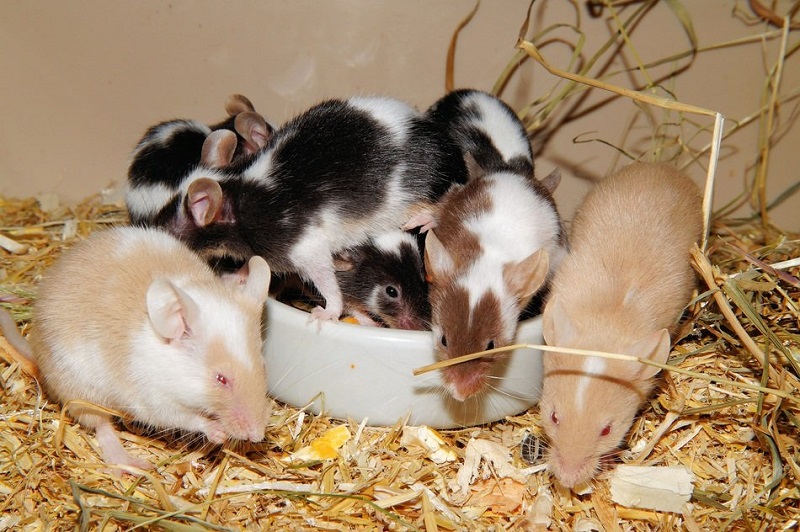

I study the surprising effects that microbiota – the microbes that live on and inside another organism – have on behaviour. Ayres’ study has uncovered a new way that microbiota can fundamentally alter behaviour in mice, including a basic instinct such as motherly nurturing: Bill Sullivan, Indiana University
There is perhaps nothing more heartbreaking and confusing than a mother who neglects her children.
In 2017, approximately 675,000 children in the US were victims of mistreatment, with 75 per cent reported as neglected. The early postnatal months are critical to ensure proper physical and psychological development; children who are neglected during this phase can experience stunted growth as well as behavioural and learning problems. What could possibly subvert the basic instinct for a mother to take care of her child?
Scientists have uncovered a number of biological and environmental factors that can influence maternal behaviour in numerous types of mammals. Many of these studies have pointed to deficits in oxytocin, a hormone released during birth and while breastfeeding that facilitates mother-child bonding. Defects in the levels of serotonin, a key neurotransmitter that regulates mood and depression, can also interfere with the maternal instinct.
Recently a research team from the Salk Institute in La Jolla, California, led by Janelle Ayres reported a new influence on maternal behaviour arising from an unexpected source: the bacteria that dwell in the mother’s gut. Their intriguing study, published in Science Advances, was performed using mouse mothers and their offspring.
As a pharmacologist and microbiologist at the Indiana University School of Medicine, and author of “Pleased to Meet Me: Genes, Germs, and the Curious Forces That Make Us Who We Are,” I study the surprising effects that microbiota – the microbes that live on and inside another organism – have on behaviour. Ayres’ study has uncovered a new way that microbiota can fundamentally alter behaviour in mice, including a basic instinct such as motherly nurturing.
Proper development of newborns depends on microbiota
Emerging research is uncovering a clear role for intestinal microbiota in the proper development of newborns, including humans. Our intestines are populated by trillions of bacteria, which are first introduced into the body by the mother during birth. Mice are frequently used by scientists to gain insights into potential functions the microbiota may have in humans.
By feeding them high doses of antibiotics, researchers can create “germ-free” mice that lack microbiota. Alternatively, germ-free mice can be birthed using sterile techniques. Germ-free mice grow more slowly and suffer from a number of immune system deficits and social behaviour issues. In addition to helping digest food and manufacture nutrients, a newborn’s gut bacteria regulate the production of insulin-like growth factor 1, a crucial growth hormone and that promotes proper development of bone and tissues.
In Ayres’ new study, she and her colleagues found a novel way that intestinal microbes contribute to mother-child bonding. For the first time, her research team found that the mother’s microbiota can impact her behaviour in a way that can be detrimental to her pups. While it is widely accepted that an infant’s microbiota is important for proper development, the effect of the mother’s microbiota on nurturing behaviour had not been previously considered.
Ayres’ team administered several different kinds of E. coli bacteria into germ-free mice and discovered that mothers housing one called E. coli O16:H48 had pups with stunted growth. Pups born to these mothers had impaired signalling through the insulin-like growth factor 1 that led to less fat and muscle development.
How microbes cause a mother to neglect her offspring
Several possibilities could account for their developmental delays, but the researchers found no behavioural issues in the pups that would lead them to consume less food than usual. In addition, the mother was producing milk normally. Further study suggested that stunted growth was a result of maternal neglect, causing the pups to be malnourished. Mothers colonised with E. coli O16:H48 spent less time on maternal behaviours such as nest-building, grooming and nursing.
The maternal instinct to feed her pups appeared to have been erased in mothers harbouring E. coli O16:H48. To confirm their hypothesis, the researchers transferred the newborn pups of mothers with E. coli O16:H48 to the care of foster mothers displaying normal nurturing activities. Pups raised by the foster mothers developed normally. At least in mice, E. coli O16:H48 makes good mothers go bad.
These findings lend further support to the gut-brain axis, which refers to the complex array of chemical signals that microbiota in the gut sends to the brain. Different species of intestinal bacteria produce different chemical signals, which contributes to the variations in behaviour observed between individuals. Evidence that the gut-brain axis can also influence child-rearing underscores the importance of microbiota across generations.
Future research will focus on how E. coli O16:H48 in the mother’s gut alters the mother’s behaviour and which bacterial molecules are responsible. A 2016 study by a different group demonstrated that the oxytocin system can be modulated by the intestinal microbiota. But Ayres’ team did not find alterations in oxytocin in mothers with E. coli O16:H48. Analysis of the E. coli O16:H48 genome suggests that this bacterial strain may exert its detrimental effect on behaviour by altering levels of the neurotransmitter serotonin in the mothers.
It should be stressed that there is currently no evidence that this E. coli strain operates in humans as it does in mice to affect a mother’s attentiveness to her young. Moreover, the study was performed using germ-free mice colonized with only a single strain of E. coli bacteria.
Nonetheless, these findings warrant further investigation into how a human mother’s microbiota may influence behaviours that can affect the welfare of children. It now appears that optimal infant care requires more than the baby’s diet; future research should consider the composition of mother’s microbiota as well. Doctors commonly agree that a healthy microbiota can be cultivated through a sensible diet that includes plentiful fibre and fermented foods, along with regular exercise.